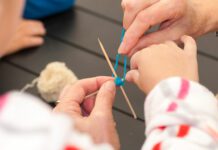Now some of us may really long to see our children better, and make them feel important as individuals, but we just don’t really know how to make that happen. If that is how you feel—this blog post is for YOU!! Here are 12 small actions you can take to make sure that no child feels invisible and insignificant while they’re in your care.
1. LEARN NAMES
Is there anything more important and basic than learning our students’ names early in the school year? Dale Carnegie said, “Remember that a person’s name is to that person the sweetest and most important sound in any language.”
Make it your goal to have all your students’ names learned by the end of the third week. There are lots of practical strategies for learning names: wear name tags, play name games, use students’ names frequently, and of course, PRACTICE! PRACTICE! PRACTICE!
One good way to learn names and match them to the faces is to have children fill out one of the many variations of All About Me templates. Here are just a few examples:
Once the students complete their All About Me worksheets, staple them to the wall and attach their photographs (each template provides room for a headshot). This simple exercise will give you a better understanding of your students, help you remember their names and make the classroom feel like home. After all, home is where your photo is, right? Also, it will give all the students a fun way to learn about each other and find all the things they have in common.
2. PRAY FOR YOUR STUDENTS BY NAME
Prayer is remembering someone before God, and it is one of the highest forms of caring. (It’s also hard work, so don’t be surprised if it doesn’t come naturally to you.) When you pray for your students by name during the week, you think about them, your heart softens and opens toward them, and you allow God to drop insight, wisdom and compassion into your spirit that will help you love that specific child well.
3. CLEAR YOUR MIND
I know you’re a busy person with a million things on your mind and your to-do list. Especially on Sunday. It’s easy to drag the weight of the world with you into your classroom.
However, your students should never see a grumpy, irritable, no-fun adult running their class. After all, you may be the only representation of Jesus that they have in their life. That’s why it’s absolutely necessary that you take time to clear your mind and emotions from all distractions, and focus on one goal—loving children well.
The best way to do this is to establish a simple ritual. Perhaps your drive to church could be your time to declutter your head, fill your spirit and readjust your focus. You can do it by listening to worship music and singing along. You can do it by praying, or simply by driving in complete silence, giving God room and time to speak to your heart.
It could be a certain spot, perhaps your classroom door, where you would pause for a moment to remind yourself that no “junk” is allowed beyond this point. Perhaps that’s where you would say a short prayer leaving your cares, worries and hectic schedule at the feet of Jesus.
Or it could be a certain time that you predetermine in advance, a cutoff point where you know that you need to stop whatever you’re doing and switch your focus, fostering a warm and welcoming spirit.
If it’s between the kids finding you all frazzled and disoriented, trying to figure out how that magic trick or science experiment works, or you warmly welcoming them and engaging them into a conversation from the moment they step into your classroom, choose the latter. Drop the magic trick, no matter how cool it might be, but never the child. Believe me, 10 years later kids won’t remember your tricks, experiments or object lessons, but they will remember how you made them feel in your classroom. And the memory of that feeling will either draw them closer to the heart of God or push them further away.











